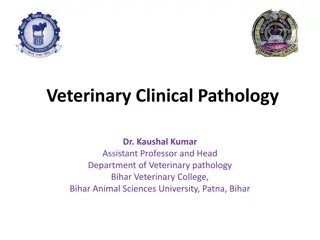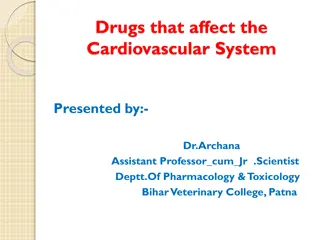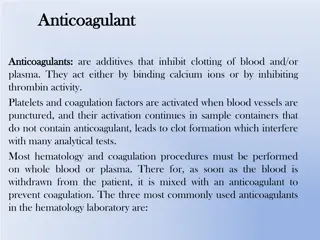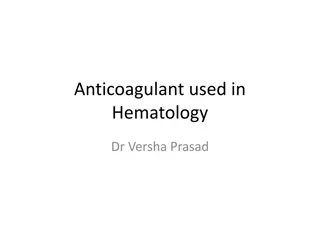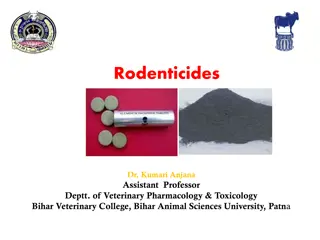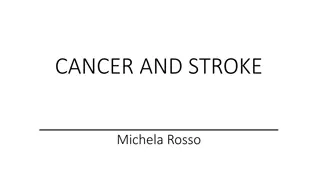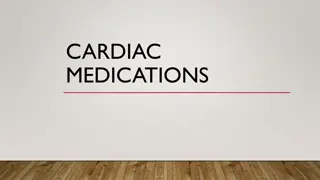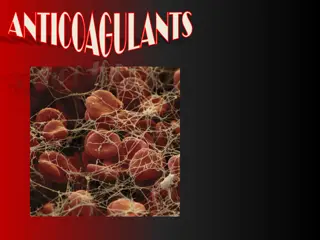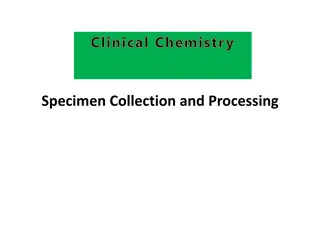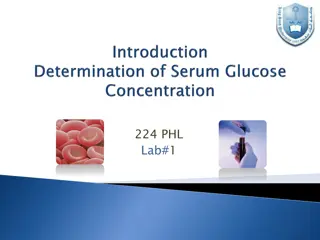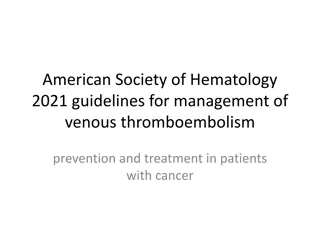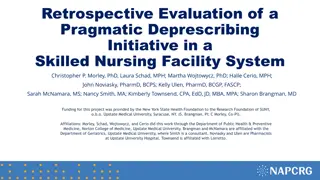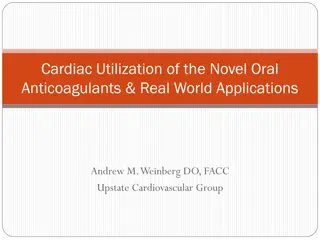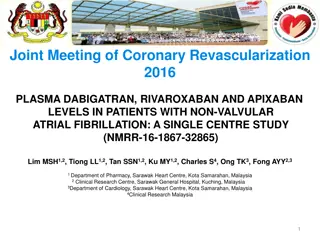Overview of Veterinary Clinical Pathology and Importance of Anticoagulants
Veterinary clinical pathology involves the laboratory diagnostics and analysis of bodily fluids and tissues to support the diagnosis, treatment, and prevention of diseases. This field encompasses interpreting blood tests, blood smear examinations, and the use of various anticoagulants in specimen co
3 views • 46 slides
Drugs Affecting the Cardiovascular System: Overview and Mechanisms
Explore the impact of various drugs on the cardiovascular system, including cardiac glycosides, vasodilators, anticoagulants, and more. Learn about the chemical nature and properties of glycosides and how they affect the heart's functioning.
1 views • 21 slides
Understanding Anticoagulants in Laboratory Hematology
Anticoagulants are crucial additives that prevent blood clotting during laboratory procedures. The commonly used anticoagulants include EDTA, sodium citrate, and heparin, each with specific concentrations, modes of action, and color-coded identifications. EDTA is ideal for blood cell counts, sodium
0 views • 6 slides
Understanding Anticoagulants Used in Hematology Laboratory
Anticoagulants play a crucial role in hematology by preventing blood clotting, allowing separation of blood components, with EDTA being the most commonly used anticoagulant. Proper blood-to-anticoagulant ratio is essential to avoid inaccuracies in results, such as falsely reduced hematocrit or erron
0 views • 10 slides
Understanding Rodenticides: Types, Effects, and Treatment
Rodenticides are chemical preparations used for rodent control, primarily targeting mice and rats. They play a crucial role in managing rodent populations to prevent associated losses. The chapter covers an introduction to rodenticides, their classification into organic and inorganic types, mechanis
0 views • 19 slides
Advances in Anticoagulation Therapy for Cancer-Related VTE and Stroke
Recent studies have shown advancements in anticoagulation therapy for cancer patients with venous thromboembolism (VTE) and stroke prevention. Direct oral anticoagulants (DOACs) are now considered beneficial for treating VTE in cancer, offering advantages in administration and efficacy. Different an
3 views • 9 slides
Overview of Cardiac Medications and Their Effects
This comprehensive guide covers various types of cardiac medications including anticoagulants, antiplatelet drugs, thrombolytics, and beta-blockers. It details their mechanisms of action, dosage guidelines, side effects, and contraindications. Anticoagulants prevent blood clotting, antiplatelets inh
0 views • 20 slides
AHCCCS Pharmacy and Therapeutics Committee Recommendations May 23, 2023
The AHCCCS Pharmacy and Therapeutics Committee made recommendations on various drug classes, including Analgesics, Narcotics, Antibiotics, Inhaled, Anticoagulants, and Antimigraine Agents. The recommendations specify preferred products and changes in preferred status for certain medications. Brand p
0 views • 45 slides
Quality Improvement Initiatives for Reducing Anticoagulant-Related Harm: A Review
The review focuses on reducing harm associated with anticoagulant use through quality improvement initiatives. It discusses under- and over-utilization, inappropriate prescribing, and suboptimal management of adverse drug events. The project aims to identify literature, guidance, and improvement ini
0 views • 27 slides
Understanding Anticoagulants: Mechanisms, Indications, and Limitations
Anticoagulants play a crucial role in preventing blood clotting and are used in various medical conditions such as myocardial infarction and deep venous thrombosis. They include heparin, warfarin, and antiplatelet agents like aspirin. This article explores the mechanisms of action, indications, and
0 views • 29 slides
Clinical Chemistry Specimen Collection and Processing Overview
Clinical chemistry specimen collection involves obtaining blood samples for analysis. Serum and plasma are commonly used specimens, each requiring specific handling. Different anticoagulants like heparin are used to prevent blood clotting during sample processing. Heparin, a widely used anticoagulan
0 views • 15 slides
Understanding Biochemical Experiments and Blood Components
This content delves into various aspects of biochemical experiments, including qualitative and quantitative methods for substance identification and concentration measurement. It also covers the use of a spectrophotometer and different bodily fluids for analysis. Additionally, it explores the compon
0 views • 20 slides
American Society of Hematology 2021 Guidelines for Venous Thromboembolism in Cancer Patients
The American Society of Hematology (ASH) 2021 guidelines provide recommendations for preventing and treating venous thromboembolism (VTE) in cancer patients. The guidelines cover primary prophylaxis for hospitalized medical patients and those undergoing surgery, emphasizing the use of thromboprophyl
0 views • 23 slides
Understanding Anticoagulants and Their Indications
Explore the world of anticoagulants through images, covering different types like warfarin and NOACs, their indications such as AF, DVT, and PE, monitoring in clinics, and specific drug details like apixaban, rivaroxaban, dabigatran, and edoxaban. Get insights into dosages, administration, and drug
0 views • 27 slides
Retrospective Evaluation of Pragmatic Deprescribing in Skilled Nursing Facilities
This study evaluated the effectiveness of a pragmatic deprescribing protocol in reducing medication classes in two skilled nursing facilities. Findings showed significant reductions in diuretics, opioids, antipsychotics, and antibiotics, with slight overall medication changes. Increases in anticoagu
0 views • 6 slides
Understanding Cardiac Utilization of Novel Oral Anticoagulants
Dive into the realm of cardiac anticoagulation, exploring the evolution from traditional methods like Warfarin to the modern use of Novel Oral Anticoagulants (NOACs). Discover the indications for long-term anticoagulation in conditions like atrial fibrillation and mechanical heart valves. Delve into
0 views • 46 slides
Plasma Levels of NOACs in Patients with NVAF: Single Centre Study
This study aims to characterize the plasma levels of Dabigatran, Rivaroxaban, and Apixaban in patients with non-valvular atrial fibrillation (NVAF) who have been taking these drugs for more than 4 days. The research also assesses median trough plasma levels of these anticoagulants, as well as their
0 views • 18 slides
